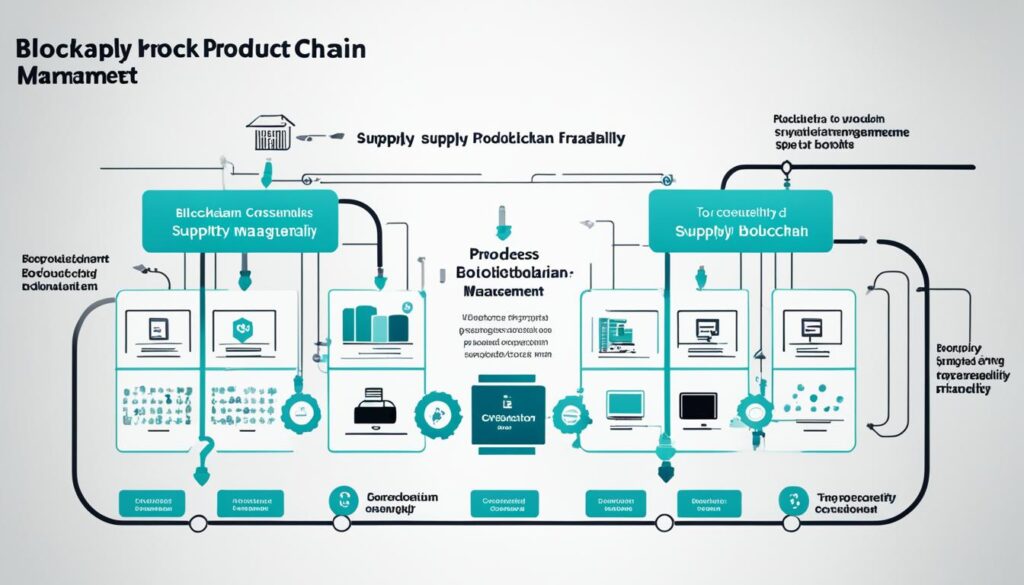In today’s globalized and technologically advanced world, supply chain management has become increasingly complex. From the production of goods to their delivery to the end consumer, every step must be carefully coordinated to ensure efficiency and customer satisfaction. However, numerous challenges hinder the smooth operation of supply chains, including lack of transparency, limited traceability, and issues of trust among participants.
Did you know that the blockchain in supply chain management market is projected to reach a value of approximately USD 17.15 billion by 2030? This astounding statistic highlights the immense potential of blockchain technology in transforming the way supply chains operate, not only in Nigeria but worldwide.
Blockchain technology offers a promising solution to the complex problems faced by supply chain management. By leveraging decentralization, transparency, and enhanced security, blockchain provides a secure and immutable platform for tracking goods, verifying transactions, and ensuring accountability at every stage of the supply chain.
Key Takeaways:
- Blockchain technology has the potential to revolutionize supply chain management.
- By implementing blockchain, supply chains can achieve transparency, traceability, efficiency, and enhanced security.
- The blockchain in supply chain management market is expected to reach a value of USD 17.15 billion by 2030.
- Blockchain improves trust between supply chain participants and reduces the risk of fraud.
- Nigeria industries and beyond can benefit from implementing blockchain solutions in their supply chain management processes.
Understanding the Basics of Blockchain Technology
Blockchain technology has emerged as a game-changer in the digital world, with its decentralized nature and transparent transaction recording system. Originally introduced as the foundation of Bitcoin, blockchain technology has expanded to various other applications, including supply chain management, finance, government services, and more.
A blockchain is a decentralized digital ledger that securely and transparently records transactions. It consists of blocks linked together in chronological order, where each block contains verified transactions. This decentralized nature eliminates the need for intermediaries or centralized control, providing a secure and efficient way to record and validate transactions.
One of the key features of blockchain technology is decentralization. Traditional systems rely on a central authority, such as a bank, to validate transactions. In a blockchain, transactions are validated by a network of computers (nodes) spread across the globe, ensuring the integrity of the data and making it virtually tamper-proof.
Transparency is another crucial aspect of blockchain technology. Every transaction recorded on the blockchain is visible to all participants in the network. This transparency enhances trust, as it allows for real-time verification of transactions and prevents fraud.
Security is a paramount concern in the digital era, and blockchain technology addresses this by utilizing advanced cryptographic techniques. Each transaction on the blockchain is encrypted and linked to the previous transaction, forming a chain that is resistant to alteration. This ensures the integrity and immutability of the recorded data.
There are different types of blockchains: public, private, and consortium. Public blockchains, like Bitcoin and Ethereum, are open for everyone to participate and verify transactions. Private blockchains restrict access to a specific group of participants, providing increased privacy and control. Consortium blockchains are a hybrid model, where multiple organizations collaborate to operate and secure the blockchain network.
Benefits of Blockchain Technology
Implementing blockchain technology brings several benefits to various industries, including supply chain management:
- Increased Transparency: With blockchain, every transaction is recorded and visible to all participants in real-time, enhancing transparency and trust.
- Improved Security: Blockchain technology utilizes advanced cryptographic techniques, making it highly secure and resistant to tampering or fraud.
- Enhanced Efficiency: Automating processes through blockchain leads to streamlined operations, faster transaction settlements, reduced paperwork, and increased overall efficiency.
- Cost Savings: By eliminating intermediaries and automating processes, blockchain reduces costs associated with paperwork, third-party verification, and reconciliation.
- Improved Traceability: Blockchain enables tracking and tracing of products throughout the supply chain, ensuring accountability and ethical sourcing.
Decentralization and Trust
“Blockchain is the technology of trust. It eliminates the need for intermediaries and provides a decentralized system where trust is embedded in the network itself.”
The decentralization of blockchain technology eliminates the reliance on a central authority, reducing the risk of manipulation and improving trust among participants. This decentralized approach ensures that all transactions are validated and recorded by the network, preventing any single point of failure or control.
| Public Blockchain | Private Blockchain | Consortium Blockchain |
|---|---|---|
| Open for everyone to participate and verify transactions | Restricted access to a specific group of participants | Collaboration between multiple organizations for operation and security |
Benefits of Implementing Blockchain in Supply Chain Management
Implementing blockchain technology in supply chain management brings several benefits. It improves traceability and transparency by creating a transparent and immutable record of transactions within the supply chain. This enhances accountability, reduces the risk of fraud, and allows for real-time monitoring of products and performance.
Blockchain technology increases efficiency by automating processes, streamlining logistics, and automating payments. This leads to cost savings and faster product delivery. Additionally, blockchain enhances security through immutability, preventing tampering and enhancing trust between supply chain participants.
One of the key advantages of implementing blockchain in supply chain management is the ability to improve the customer experience. By enabling product traceability, customers can verify the authenticity and ethical sourcing of products, enhancing their trust and satisfaction.
Overall, the implementation of blockchain technology in supply chain management offers a pathway to greater efficiency, reduced costs, security, and an enhanced customer experience. It provides a transparent and trustworthy framework for businesses to optimize their supply chain operations and drive sustainable growth.
Blockchain Benefits Overview:
- Improved traceability and transparency
- Automated processes and streamlined logistics
- Enhanced security and trust
- Cost savings and faster product delivery
- Enhanced customer experience and satisfaction

Implementing blockchain technology in supply chain management unlocks numerous advantages, from increased traceability and transparency to improved efficiency and reduced costs. By leveraging the power of blockchain, businesses can enhance their supply chains, ensuring security, trust, and a seamless customer experience.
Conclusion
Blockchain technology has the potential to revolutionize supply chain management in Nigeria industries and beyond. With its ability to provide transparency, traceability, efficiency, and security, blockchain is the ideal solution for the complex and globalized nature of supply chains. By implementing blockchain technology, companies can improve their supply chain operations, reduce costs, enhance trust, and deliver a better customer experience.
As blockchain technology continues to evolve, it is expected to have a significant impact on the future of supply chain management. It will transform how goods are tracked, verified, and delivered, ensuring greater accuracy and reliability. By embracing blockchain in supply chain management, businesses can achieve improved efficiency, reduced costs, increased transparency, and sustainable business practices.
The benefits of blockchain in supply chain management are undeniable, and it is essential for companies to adapt to the changing landscape of technology. By embracing blockchain’s potential, Nigerian industries can stay at the forefront of innovation and gain a competitive edge in the global market. The future of supply chain management lies in the integration of blockchain technology, and the time is now to seize the opportunities it presents.

Leave a Reply